七年级英语上册Unit6DoyoulikebananasSectionB&SelfCheck课件新版人教新目标版
Unit-6-Do-you-like-bananas-SectionB--教学设计

U n i t-6-D o-y o u-l i k e-b a n a n a s-S ec t i o n B-(2a-2c)-教学设计(总7页)-本页仅作为预览文档封面,使用时请删除本页-Unit 6 Do you like bananas?Section B (2a-2c)Part 1 Teaching materialsThis teaching material is the second period of Section B in Unit6 Do you like bananas, including 2a,2b and 2c.This period is a reading part, mainly focusing on developing students’ reading skills, their ability of judging healthy or unhealthy food so as to adjust their own eating habits andcultivating their text awareness .In this period, it presents several expressions about eating habits, which is a good foundation of next writing class; 2a is a short pre-reading activity about judging healthy and unhealthy food, which is aimed at developing students' awareness of keeping a healthy eating habit and prepare for the next part about eating habits; the goal of 2b (a reading material selected from a magazine which is an interview about a sports star’s e ating habit) is to cultivate students' text awareness and their ability of expressing themselves and communicating with each other; the goal of 2c is to help students to adjust their own eating habits by learning the material and know more about healthy and unhealthy food after class.Teaching objectives1. Knowledge objectives:Key words & phrases:After this lesson, students should be able to say, read and write these words: star, well, habit, healthy, really, question, want, be, and fat Expressions: -----What do you like for breakfast/lunch/dinner?-----I like..../I don’t like..../He likes.../He doesn’t like...2.Ability objectives :students’speaking abilitystudents’listening ability3. Enable students to master the target language3. Emotional objectives:(1). Encourage students’ to keep a balanced diet(2). Let students learn to cooperate and enjoy learning English4. Strategies objectives:Use the listening and speaking skills to help students to cultivate their information-collecting skills and their text awareness.5. Cultural awareness:Understand the different expressions of foods, likes and dislikes between China and foreign countries and the different eating habits between China and foreign country.Teaching important points(1). Learn these words and be able to say, read and write these words:star, well, habit, healthy, really, question, want, be, and fat(2). Be able to talk about and write about one’s eating habits by using-----What do you like for breakfast/ lunch / dinner?-----I like..../I don’t like.../He likes.../He doesn’t like... /She likes.../She doesn’t like...Do you like hamburgers for dinnerThey’re not healthy./ I don’t want to be fat./ Cindy likes healthy food.Teaching difficult points: To help students to master the target language.Be able to understand the difficult sentences like:Which food do you think is healthy?David asks the volleyball star, Cindy Smith, about her eating habits.Part 2 Analysis of StudentsStudents in 7th grade are so active and energetic that they are willing to participate in classroom activities. Before this lesson, the students have learned the expressions of foods and likes and dislikes. And the topic of this part (2a-2c) is about eating habits which students are very interested in. However, students are not so good at judging healthy and unhealthy eating habits. Thus, the teacher should help students to master the key words and phrases, cultivate their awareness of keeping a healthy eating habit through activities, encourage them to search for more information about healthy and unhealthy food to adjust their own habit and prepare for the next class.Part 3 Teaching methods(1). Situational teaching method(2). Task-based teaching method(3). Communicative and cooperative teaching methodsPart 4 Teaching aidsMultimedia, chart, blackboard, projector and chalksPart 5 Teaching proceduresI will design the following steps to organize the teaching.Step1.Warming up and leading in(1). Show some pictures about food, vegetables and fruit. review the words about food.(2). Use the following sentences to talk about your favorite food.What do you like for your breakfast / lunch / dinnerDo you eat healthy foodFor breakfast / lunch / dinner, I like….I like … for breakfast / lunch / dinner.Step2.Brainstorm. Talk about healthy food and unhealthy food. Ask students to think as many words as possible. What kind of food do you think are healthy or unhealthy?healthy food :fruit,vegetables, salad , eggs ,milk…unhealthy food :hamburgers ,ice-cream,French fries , coffee,cola ,sweets, snack ,chocolate ,milk tea , fried chickenWork on 1a.food do you think is healthyCheck (√) Yes, Maybe or No.3.Step 3 While-reading activities (读中活动)T: Today I’ll introduce a new friend to you. Look, this is Cindy Smith. She is a volleyball star. Do you want to know more about her If so, follow me.Task 1 PredictLook at the picture and the title to predict :1. What’s the article about What does the title mean2. Read the passage fast and silently to find the general idea.The main idea of the magazine article is about _________.A. sports starB. Cindy’s eating habits C: sports star likes fruitTask 2. Read the article carefully again and answer the questions:(1). Who is Cindy Smith(2). What does Cindy like for breakfast?(3). What does Cindy like for lunch?(4). What does Cindy like for dinnerto the magazine article and circle the food words.Task4: Complete the mind map: Cindy’s Eating Habits.Task5: Read the article and write five sentences about Cindy’s eating habits. . Cindy likes fruit for breakfast.Cindy likes healthy food.1. Cindy _______________________________2. She _________________________________3. She _________________________________4. Cindy doesn’t ________________________5. She doesn’t __________________________Task6: Ask students to answer the following questions.(1). What do you think of Cindy Smith’s eating habits?(2). Does she have healthy eating habits?We should eat healthy food and have a healthy eating habitStep 4. Post-readingAsk students to complete the passage and try to retell the Cindy’s Eating Habits.Cindy’s Eating HabitsCindy is a volleyball star. She has good ____________. She loves breakfast, she likes __________________, but she doesn’t like bananas. For lunch, she likes____________ . For dinner , she doesn’t like _____________because she thinks they are not has chicken for dinner. She likes ____________, but she doesn’t eat it after dinner, because she doesn’t want to be fat.Step5. Summary:(1). Summary what we learn: words and sentences.(2). Present moral objectives.An apple a day keeps the doctor away.Diet cures more than doctors. 饮食有节胜过求医。
人教版英语七年级上册教案:Unit6 SectionB(2a-2c)

人教版英语七年级上册教案:Unit6 SectionB(2a-2c)Unit6 SectionB(2a-2c)教案【教材版本与册数】新目标人教版七年级上册【单元名称】Unit 6 Do you like bananas?【课时】Section B 2a-2c(第4课时)【课型】Reading(阅读课)教材分析【本单元话题】喜欢和不喜欢(like and dislike)【本单元重点掌握目标】行为动词在一般现在时句子中的使用,应该是上一个单元内容的延伸,通过本单元的教学,学生应初步掌握行为动词一般现在时的肯定句、否定句、特殊疑问句、一般疑问句的构成以及简单的回答和表示食物的可数名词和不可数名词。
【教材内容坼分分析】本单元Section A主要是谈论喜欢和不喜欢(like and dislike),Section B进一步拓展了此话题,按照“听力输入--阅读训练--由读促写”的过程逐层递进。
【通过本单元的学习学生需掌握的综合技能】训练学生的听、说、读、写四项基本技能,学会询问对方与了解别人喜欢与不喜欢的食物,学会谈论自己与他人早、中、晚餐喜爱吃的食物,为其今后能在交际中恰当地表达自己的情感、灵活运用已经学过的常用功能项目、进一步学习并掌握新的语言功能奠定坚实的基础。
第 2 页第 3 页DEL C2 获取新知Step2Reading1. T: Well, let’s see some sports star’s eating habits. Cindy Smith is avolleyball star. What does she like for breakfast, lunch and dinner? Doesshe eat ice-cream? Now let’s r ead the magazine article about Cindy Smith.First, read the article and circle the food words.(Ss read the article and circle the food words quickly.)2.Read the article and fill in the blanks.3. We know Cindy has healthy eating habits. What food does she like? Whatfood doesn’t she like? Read the article and write five sentences aboutCindy’s eating habits. e.g.Cindy likes fruit for breakfast.1.带着问题阅读文章,寻找答案2.再读文章,完成练习学生能够自主阅读文章并寻找答案第 4 页(注意运用句型:Cindy likes … for … 或Cindy doesn’t like/eat … for …)4. Let some Ss read their sentences to the class.5. Then finish 2c.Write five sentences about Ci ndy’s eating habits.Cindy likes healthy food.1. Cindy ___loves fruit.____________________________2. She ____likes oranges and bananas._____________________________3. She _____likes salad for lunch.____________________________4. Cindy doesn’t ___like hamburgers for dinner._____________________5. She doesn’t ___eat ice-cream after dinner._______________________Step3 Language points 1. Sports star eats well!句中的well用作副词,意为“好”,用来修饰动词eat,意为“吃得好”。
七年级英语上册Unit6DoyoulikebananasSectionB1a,1b,1c,1d,1e

四川省射洪县外国语学校七年级英语上册《Unit 6 Do you li ke bananas SectionB 1a ,1b,1c,1d,1e》导学案(无答案)人教新目标版执教教师:学生姓名单元主题Unit 6 Do you like bananas? 课题Section B 1a,1b,1c,1d,1e学习准备课本,导学案,练习本学习过程疑问、收获A1 Activation (激活)1.跟老师一起快乐进入课堂。
2.迅速回顾一些蔬菜水果食物的词汇以及句型。
A2 Aims (树标)我们的课题:利用蔬菜水果食物名词练习 Do you like... ?的句型。
我们的目标:我要听懂和写出以上名词,我还要学会这个句型。
A3 Activity(实战)一. Preparation.听前热身.完成Sectio n B 1a.二.听录音,将所听到的单词填写在横线上.录音播放两遍.A4 Application(迁移运用)Sally: Do you like carrots?Tom: Yes, I do. I like all vegetables.Sally: How about salad? Do you like salad?Tom: Yes, I do. It's great! Do you like vegetables?Sally: No, I don't like vegetables. Well, only salad. But I like fruit. I like bananasand oranges ...Tom: How about apples? I don't li ke apples!Sally: Yes, I like apples. And you know w hat I really like?Tom: What?Sally: Ice-cream!一.再听一遍听力材料,完成一下问题。
Unit6DoyoulikebananasSectionB2a-2c课件人教版七年级英语上册
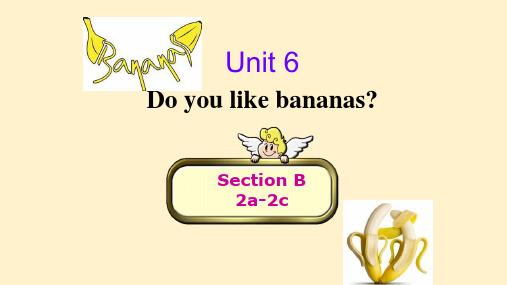
F3. Cindy really likes salad for dluinnncehr.
T4. Cindy doesn’t eat ice-cream after dinner, because she
want to be fit.
keep/be fit 保持健康/身材
Careful reading Read and fill in the chart.
For breakfast
She likesa_p_p_l_e_s__ and o_r_a_n_g_e_s_. She doesn’t like_b_a_n_a_n_a_s.
For lunch salad
For dinner
She likes _c_h_ic_k_e_n_ for dinner. She doesn’t eat _h_a_m__b_u_rg_e_r_s, because they’re u_n_h_e_a_l_t_h_y__.
2b Read the passage and circle the food words.
Sports Star Eats Well! David asks the volleyball star, Cindy Smith, about her eating habits. David: Hello, Cindy. What do you like for
If a thing is worth doing it is worth worth doing well
Look at the title, what does it mean(意思是)?
It means a sports star eats healthห้องสมุดไป่ตู้ food.
七年级英语上册 Unit 6 Do you like bananas(第5课时)Section B(2a-3b)课件 (新版)人教新目标版

二、根据句意及汉语提示写单词。
6.Dale's brother _w_a_n__ts_(想要) an apple. 7.My son has good eating _h_a_b_i_t_s (习惯). 8.Fruit and vegetables are __h_e_a_lt_h_y_(健康的) food. 9.You can ask me some __q_u_e_s_ti_o_n_s_(问题). 10.The picture is __r_e_a_ll_y__(真正地) nice.
Unit 6 Do you like bananas?
第五课时 Section B(2a~3b)
1.Sports star eats well.体育明星吃得好。 (1)sports star体育明星。 (2)eats是eat的第三人称单数形式。在一般现在时中,当主语是 第三人称单数,就用动词的第三人称单数形式。 (3)well adv.好,主要用于修饰动词。 2.ask sb. about sth.向某人询问某事 3.her eating habits她的饮食习惯 此处eating作定语。eg: I have good eating habits.我有好的饮食习惯。
4.healthy 形容词,意为“健康的”,其名词形式为health,其反义词为 unhealthy。 5.I don't want to be fat.我不想长胖。 want“要,想要”,常用结构有:want sth.“想要某物”;want to do sth.“想做某事”,want sb. to do sth.“想要某人做某事”。 6.What do you like for breakfast?你早餐喜欢什么? (1)for 介词,意为“为了,给”,在句型“have…for breakfast/lunch/dinner”中表示“某人吃什么。” (2)breakfast前面不能用冠词,一日三餐前一般不加冠词。
七年级人教版英语上册Unit6Doyoulikebananas?全单元教案

Unit 6Do you like bananas?Period 1(Section A 1a-1c)Teaching aims1. Learn words and be able to say, read and write them:orange(s), banana(s), strawberry, strawberries, pear(s), apple(s),tomato(es), carrot(s), vegetable(s), hamburger(s), egg(s), ice-cream(s),salad(s), bread, chicken2. Be able to talk about likes and dislikes by using:I/We/They like oranges. He/She likes oranges.I /We/They don’t likebananas. He/She doesn’t like hamburgers.Do you like salad? Yes, I do./No, I don’t.Does he/she like tomatoes? Yes, he/she does. / No, he/she doesn’t.3.Understand the difference between countable nouns and uncountable nouns.Teaching key and difficult points:1.Learn these words and be able to say, read and write them:2.Be able to talk about likes and dislikes by using:I/We/They like oranges. He/She likes oranges.I /We/They don’t likebananas. He/She doesn’t like hamburgers.Do you like salad? Yes, I do./No, I don’t.Does he/she like tomatoes? Yes, he/she does. / No, he/she doesn’t. Moral objects(1)To call students ’ attention to otherserests and’ei n ablet themto care more about classmates.(2)To improve Sts ’communicating skills and enable them to keeptheir health.教学设计备注Step 1. Warm-up and revision(1)Daily greeting to the students(2)Revision: What ’s this/that in English ? What coloris it?T:What ’s this in English? (show a picture of andorange)T:What color is it?Step 2. Presentation –New words.(1)Go on asking: What ’s this/that in English ? Whatcolor is it?T:What ’s this in English? (show a picture of anapple and if the student don’t know it, show thephonetic symbol of the word.)T: Spell it, please.S: A-P-P-L-E.T: What color is it?S: It ’s red.(Present the other three words as above: pear,strawberry, banana )T:We can call all of these things fruit . (Teach the newword “fruit ”.)Show pictures and ask the Ss “What arethese/those? ”and ask the SS to spell the pluralforms of these words: oranges, apples, pears,strawberries, bananas.(2)Repeat step (1) to present: carrot, carrots,tomato, tomatoes and vegetable, vegetables.(3)Present some more words by showing pictures. Get theSs to make an effort to pro nounce and spell the new words.Bread, hamburger ,hamburgers, milk, ice-cream,ice-creams, salad, chicken ,an egg, eggsWe can call all of these things food:食物3.Memory Challenge: Who has the best eyes?(1)Show the pictures, and say the plural forms of the nouns andsome uncountable noun.(2)Summarize. 可数名词有复数形式 , 不可数名词一般没有复数形式Step 3Presentation Target language 11. Show the pictures and say:I like tomatoes, but I don’ t like bread.2.Let students say:I like, but I don’t like ....3. Show the pictures and say:She likes bread, but she doesn’t like milk.He likes chicken, but he doesn’t like eggs.4.Let students say: He/She likes , but he/she doesn’tlike ....According Ss’answers and say:5. Sing a chant:Bananas, bananas, I like bananas! Salad, salad, I like salad!Strawberries, strawberries,I don ’t like strawberries!Pears, pears, he likes pears!Milk , milk, he likes milk!Tomatoes, tomatoes,He doesn ’t like tomatoes! Step 4 Work 1a .1. Read the words.2.T: Look at the pictures and fill in the chart .Fruit Food Vegetable3.Match the words with the things in the picture.4.Check the answers .Step 5 Present the new language 1 .1. T: Oh, we have lots of delicious fruits . I like apples best.Do you like apples ?S1 :Yes , I do. I like apples.S2: No, I don't . I like salad.T: Do you like salad ? S3: Yes , I do. I like salad./ No, I don't . I don’tlike salad.Step 6 Pairwork .1. T: Work in pairs .Ask and answer with your partners .(Before class the students have draw some pictures of the food )2. Get the Ss to ask and answer in pairs, using the sentences:’t.A: Do you like ?B: Yes, I do./ No, I don 3. When you ask andanswer, please fill in the chart. Name Like DislikeStep 7 Present the new language 2 .1.Show pictures and ask and answer questionsDoes she/he like ?Yes, she/he does. She/He likes/ No, she/he doesn ’t. She/He doesn ’tlike .Step 8 Pairwork .1. T: Work in pairs .Ask and answer with your partners .2.Get the Ss to ask and answer in pairs, using the sentences:Does she/he like ?Yes, she/he does. She/He likes/ No, she/he doesn ’t. She/He doesn ’tlike .3.According Ss’answers and ask “Do they like ? Yes, they do./ No, they don’t.”Step 9 Work on 1b.1.T: 1b. List en and number the conversations.2.Listen.3.Check the answers.4.Read after the tape.Step 10 work on 1c.1.First, practice the conversations in 1b.Then, make a survey and fill in the chart below.2. Report: I like milk and tomatoes, but I don’t like ice-cream. Mary likes oranges, but she doesn’liket milk orice-cream. Tom likes tomatoes and strawberries, but hedoesn ’ t like bread.Step 11 . HomeworkWrite down the report.Blackboard design:New Words Unit 6 Do you like bananas?Do you like?Yes , I do. I likeNo ,I don ’t. I don ’tlikeDoes she/he like ?Yes, she/he does. She/He likes/No, she/he doesn ’t. She/He doesn ’tlike.Period 2(Section A 2a-2d)Teaching aims:1. Words & expressionsBirthday, dinner, week, think about, food, sure, how/whatabout ? Burger, vegetable, fruit, apple, then2. Target languageI like strawberries, they’re delicious. Let’s have them.--Yes, I like them ,too./ No, I don’tlike them.I like salad, it ’s delicious. Do you like it?-- Yes, I do./No, I don’t but I likeice cream.Let ’ s have Let ’s think about the food.Ability goalsEnable students to talk about likes and dislikes.Learning ability goalsHelp students learn how to talk about likes and dislikes.2. Listening and speaking skills.Moral object:Learn to keep healthy.Teaching important / difficult pointsHow to talk about likes and dislikes with the target language.教学设计备注Step1 Warm up and revision.1.Everyday greeting.2.Review.Show the pictures and say the singularforms and the plural forms of the countable nouns.3.Show some pictures of the uncountable nouns.4.Summarize.(1).当可数名词复数再次出现时,用“They( 主语)或 them(宾语)”替代。
新人教版七年级英语上册Unit6 Do you like bananas? Section B 课件

【5】I don't want to be fat. 我可不想变胖。 【知识点】 want的用法。 【讲解】want是及物动词,意为“需要;想要”,其后常接名词、代词、动词不定 式(to do)或复合宾语(sb. to do)。 【举例】 —What do you want to be? 你(长大了)想成为什么? —I want to be a basketball star like Lin Shuhao. 我想成为一名像林书豪一样的篮球 明星。 I want a sweater. 我想要一件毛衣。 I want him to play baseball with me. 我想让他跟我一起打棒球。
healthy
food
名师点津
【1】Sports Star Eats Well! 体育明星吃得好! 【知识点】 sports star和well 的用法。 【讲解1】 sport n. 意为“运动”,其复数形式为sports,而句中的sports则是充当形容词, 意为“有关运动的”。
star n. 意为“星星;明星”, 变复数时直接在词尾加“s”即可。 【举例】I need a pair of sports shoes. 我需要一双运动鞋。(句中sports为形容词) Martin often does sports after school. 马丁经常在放学后进行运动。(句中sports为sport的 复数,是名词) She is a movie star. 她是一位电影明星。
( )2W. hWaet have_______breakfast at homfoer every day.
A. / A
C. the
B. a D. an
人教版英语七年级上册 Unit 6 Section B教案
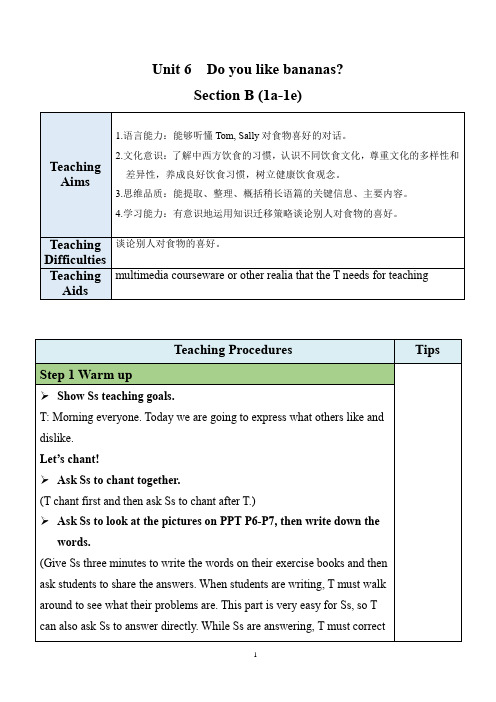
Unit 6 Do you like bananas?Section B (1a-1e)Unit 6 Do you like bananas?Section B (2a-2c)➢Ask Ss to write more healthy food and unhealthy food.Answers will vary.While-readingFirst Reading➢Reading Tip 1: PredictingT asks Ss to look at the title and pictures in 2b, try to predict: What's the article about?(T tells Ss what predict is: to have a guess. Any answer is OK here. Ss can tell the reason why they guess so.)Second Reading➢Reading Tip 2: scanningAsk Ss to scan the passage and complete the thinking map.➢Reading Tip 3: ScanningAsk Ss to judge which sentence is right and which sentence is wrong according to the passage.Answers: 1. F 2. F 3. T 4. T 5. TThird Reading➢Reading Tip 4: RetellingT asks Ss to retell the passage.(T can use the table above and give some clues to help Ss retell. T can say the first words of the sentences or use transitional words or questions to remind them of the next sentence if students forget. There will be somegrammatical mistakes when they are retelling, so teachers must use some transitional words to connect the sentences together, or to correct their pronunciations.)2b➢Ask Ss to read the magazine article and circle the food words.➢T ask Ss to write down the food that Cindy likes for meals and David likes for meals.T: Just now you have circled all the words about food. What does Cindy like for breakfast, lunch and dinner? What does David like for breakfast, lunch and dinner? Now write B for breakfast, L for lunch and D for dinner after the words.➢Let each S take out a piece of paper. Show Ss PPT P18 and ask them to write down the Chinese translation for each phrase.2c➢Ask Ss to write down five sentences about Cindy’s eating habits. While Ss are completing 2c, walk around the room and look at the sentence of different Ss. Choose sentences in which there are common errors, and write these sentences on the board. Then have Ss work in pairs to find the errors and suggest corrections. Elicit from Ss how to correct the sentences, and make the corrections on the board.Answers will vary.Post-reading➢Optional choice: Divide Ss into groups of four. Ask them to discuss what they like to eat for each meal. T can encourage Ss to say more about their preferences, e.g. I like ... but I don’t like ..., I always / never have ... for ... (T can write these sentences on the board if necessary).Unit 6 Do you like bananas? Section B (3a-Self Check)Exercise 1➢Ask Ss to write the plural forms of the words in the box on the left, then put them into the correct columns.Answers 1:Exercise 2➢First, ask Ss to choose a topic (i.e. the food / sports / colors they like or dislike), then let them write five sentences for that topic. Answers will vary.Exercise 3➢Tell Ss that they need to think about the food / sports / colors their parents like and write five sentences.Answers will vary.(T can encourage Ss to correct each other’s sentences first, then pick some Ss to read their answers to the whole class. )。
人教版七年级英语上册教案:Unit6 Section B(2a2c)
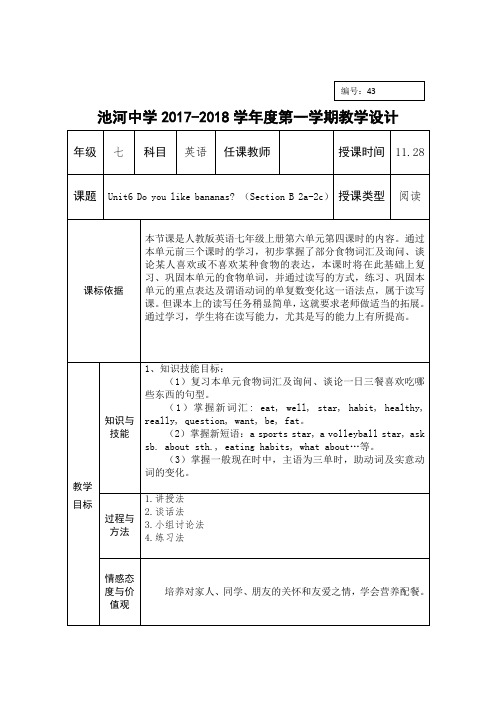
池河中学2017-2018学年度第一学期教学设计年级七科目英语任课教师授课时间11.28 课题Unit6 Do you like bananas? (Section B 2a-2c)授课类型阅读课标依据本节课是人教版英语七年级上册第六单元第四课时的内容。
通过本单元前三个课时的学习,初步掌握了部分食物词汇及询问、谈论某人喜欢或不喜欢某种食物的表达,本课时将在此基础上复习、巩固本单元的食物单词,并通过读写的方式,练习、巩固本单元的重点表达及谓语动词的单复数变化这一语法点,属于读写课。
但课本上的读写任务稍显简单,这就要求老师做适当的拓展。
通过学习,学生将在读写能力,尤其是写的能力上有所提高。
教学目标知识与技能1、知识技能目标:(1)复习本单元食物词汇及询问、谈论一日三餐喜欢吃哪些东西的句型。
(1)掌握新词汇: eat, well, star, habit, healthy, really, question, want, be, fat。
(2)掌握新短语:a sports star, a volleyball star, ask sb. about sth., eating habits, what about…等。
(3)掌握一般现在时中,主语为三单时,助动词及实意动词的变化。
过程与方法1.讲授法2.谈话法3.小组讨论法4.练习法情感态度与价值观培养对家人、同学、朋友的关怀和友爱之情,学会营养配餐。
编号:43教学重点难点教学重点A.Vocabularystar, eat, well, habit, healthy, really, question, want, be, fatB.Target languagesDo you like salad? I like chicken for dinner. I don’t like bananas.教学难点Grammar: Talk about likes and dislikes教学师生活动设计意图过程设计Step1. Lead-inGreeting and Warming upStep2. PresentationWhat do you eat for breakfast, lunch and dinner? Do you eat healthy food? Different people eat different foods. Which food do you think is healthy? Finish 2a, and discuss in pairs.Step3. ReadingRead and explain the title. What’s the meaning of “ sports star” ? What’s the meaning of “ Sports Star Eats Well” ?T: “A sports star” means a person who plays sports very well. Do you know a sports star?Yes,Yao Ming was a sports star. So what does the title mean? OK. “Sports Star Eats Well” means a sports star eats healthy food.You are going to read about a volleyball star. She has healthy eating habits. So what does she eat for breakfast, lunch and dinner?First guess the answers.Choose several students to answer. Then read about her answers to a reporter, David, and you will know.What does Cindy eat for breakfast / lunch/dinner?Check the answers.Read the article again. Answer the following questions.1. Why does Cindy like fruit?2. Why doesn’t Cindy like hamburgers?3. Why doesn’t Cindy eat ice-cream?Read it again and fill in the chart.Fill in the chart with t he food Cindy likes and doesn’t like. Cindy likes…Cindy doesn’t like…Read it again, explain any difficulty.Discussion.How can we keep healthy?What’s your advice?An apple a day keeps the doctor away.Eat healthy food and keep a balanced diet.Listen to the tape, students follow it.Retell the article according to the chart above.Step 4 Writing (Cooperation)Write five sentences , then correct the mistakes each other. 询问学生的喜好,吸引学生的学习兴趣。
2018秋人教版七年级英语上册Unit 6 Do you like bananas ?课件:Unit 6 SectionB (3a-Self Check)
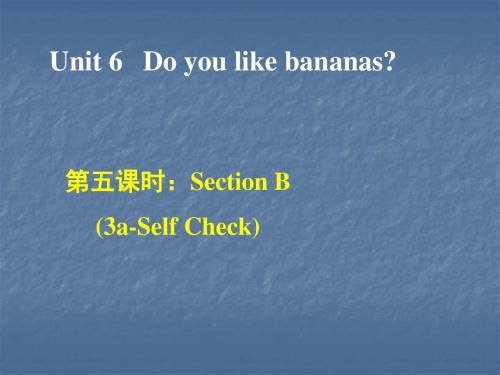
y→i+es
strawberry, dictionary, family
Self Check 2
What food, sports and colors do you like and dislike?
I like milk,eggs,basketball,ping-pong,orange and red. I don't like hamburgers,salad,ice-cream,baseball, soccer,blue and black.
morning, he runs(跑步) _______2 his sister.liHkeslikes Liu Xiang, a
great running ______3 from China. He also likes playing pingwith
-pong. He can play it very ______4. Every afternoon he plays it
table dictionary egg
apple pear
radio
vegetable family
pencil
key
volleyball
+s
+es
hamburger,carrot, photo,banana,hat, table,egg,apple, tomato pear,radio, vegetable,pencil, key,volleyball
3b
Write about what you and your partner like and don‘t like for breakfast,lunch and
dinner.
For breakfast,I like __b_r_e_a_d_,but I don't like_h_a_m__b_u_r_g_e_r_s __o_r__eg_g_s_______. For lunch,_________________________________________. And for dinnIerl,ike__r_ic_e_a_n_d__v_e_g_e_t_a_b_le_s_,__b_u_t_I__d_o_n_'t_l_i_k_e_s_a_la_d_.
初一英语上册Unit_6_Do_you_like_bananas_SectionB
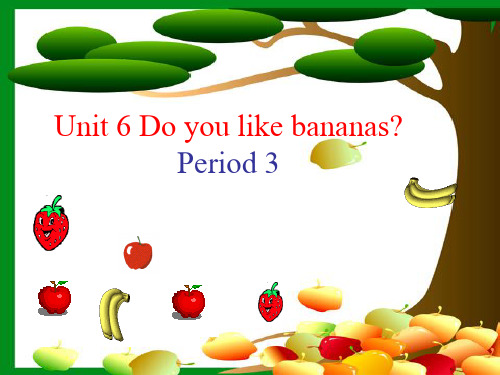
19
rice
22
3
6
7
8
3
4
7 10
41615102
5
8
9
breakfast lunch
dinner/supper
1a
What does she have /like for …..?
1B Groupwork: How many other words can you add to the lists?(四人一组写出其它单词, 可用词典,看哪组写得最多)
A:What do you have/like for breakfast/…?
B:I have/like….for breakfast.She/he has/likes…for breakfast
breakfast lunch dinner/supper
I
milk,bread
vegetables rice,meat
Pair work
A: What do you have/like for breakfast/Lunch/dinner(supper)? B: I have/like…for breakfast/lunch/dinner? C:What does she/he have/like for breakfast/ lunch/dinner(supper)? D:She/He has/likes…for breakfast/lunch/dinner.
She has a banana and a hamburger for breakfast. Does she have a banana and a hamburger for breakfast?
Yes ,she does.
人教版七年级英语上册教师用书课件:Unit6 Do you like bananasSection B-1

Ⅲ.单项选择
1.My friend Li Lei likes salad, but I don't like A at all.
A.it
B.them
C.its
D.they
解析:salad是不可数名词,代词应用it。
2.— A does your father have ________ lunch? —Chicken and tomatoes. A.What; for B.What; / C.How; for D.How; / 解析:由答语可知问句句意应是“午饭你爸爸吃什 么?”,应表达为“What does your father have for lunch?”。 故选A。
3.For D lunch, she has some hamburgers. A.a B.an C.the D./ 解析:一日三餐前不应加冠词。 4.Tommy likes milk, C for breakfast. A.egg and tomato B.egg and tomatoes C.eggs and tomatoes D.eggs and tomatos 解析:egg和tomato都是可数名词,此处都应用复数, tomato的复数应在其后加-es,故选C。
Ⅰ.根据句意及首字母提示写单词
1.Lin Shuhao is a basketball star .
2.I like vegetables for lunch
.
3.I have a good eating habit
.
4.He has a question to ask.
5.I was a fat
2.What do you like for breakfast? 早饭你喜欢(吃)什么? (1)What do/does sb.like for+某餐?意为“某人某餐喜欢 (吃)什么?”。例: What does your mother like for dinner? 你妈妈晚餐喜欢吃什么?
人教版英语七年级上册Unit6知识点总结

精品基础教育教学资料,仅供参考,需要可下载使用!Unit 6 Do you like bananas?.知识点梳理Section A课文要点全解1.Tomatoes 西红柿Tomato 可数名词,意为“西红柿”,tomatoes 是tomato 的复数形式。
There are three tomatoes on the table.桌子上有三个西红柿。
助记:以o结尾需加-es构成复数形式的名词英雄(hero)爱吃西红柿(tomato)和土豆(potato),真有意思(es)。
典例精讲-How many________are there?-About fifty.A.tomatosB. tomatoesC. tomato解析:我们可采用“语法分析法”解答本题。
句意:”有多少个西红柿?”“大约五十个。
”how many 后接复数名词,tomato是以o结尾且表示有生命的事物的名词,变复数时在词尾加-es。
答案:B。
2.Salad 沙拉Salad 名词,意为“沙拉”,它是音译而来的。
Salad 是西餐中一道经典的凉拌菜。
传统的沙拉是将洗净、切成块状或片状的生蔬菜(通常包括主菜、黄瓜和西红柿等)与沙拉酱混合,均匀搅拌即可。
沙拉也有水果沙拉(fruit salad)、土豆沙拉(potato salad)、海鲜沙拉(seafood salad)等多个品种。
Do you like fruit salad? 你喜欢水果沙拉吗?I like potato salad. 我喜欢土豆沙拉。
[拓展] 谐音记忆各种“外来食品”:[英] hamburger--音译--[汉]汉堡包[英] salad--音译--[汉] 沙拉[英] sandwich--音译--[汉] 三明治k 牛奶Milk 不可数名词,意为“牛奶”。
My father doesn’t like milk,我父亲不喜欢牛奶。
[拓展] milk 作动词,意为“挤(牛、养等的)奶”。
七年级英语上册 Unit 6 Do you like bananas Section B(1a-1e)教案
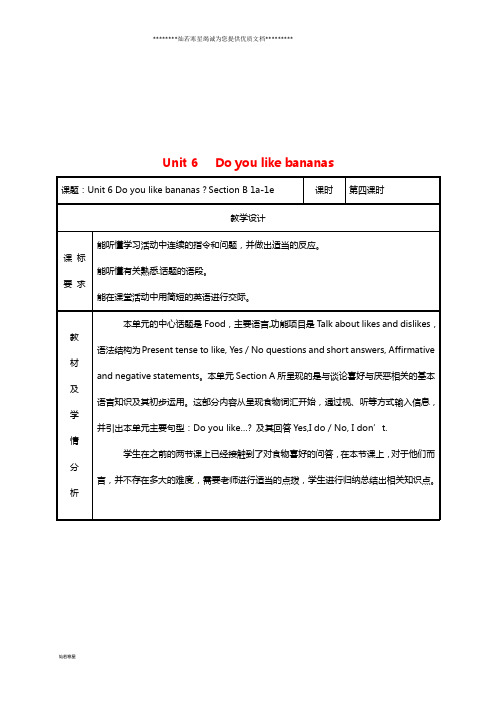
Unit 6 Do you like bananas课题:Unit 6 Do you like bananas?Section B 1a-1e 课时第四课时教学设计课标要求能听懂学习活动中连续的指令和问题,并做出适当的反应。
能听懂有关熟悉话题的语段。
能在课堂活动中用简短的英语进行交际。
教材及学情分析本单元的中心话题是Food,主要语言功能项目是Talk about likes and dislikes,语法结构为Present tense to like, Yes / No questions and short answers, Affirmative and negative statements。
本单元Section A所呈现的是与谈论喜好与厌恶相关的基本语言知识及其初步运用。
这部分内容从呈现食物词汇开始,通过视、听等方式输入信息,并引出本单元主要句型:Do you like…? 及其回答Yes,I do / No, I don’t.学生在之前的两节课上已经接触到了对食物喜好的问答,在本节课上,对于他们而言,并不存在多大的难度,需要老师进行适当的点拨,学生进行归纳总结出相关知识点。
引入新课Step 1.Warming- upand revision1 . Daily greeting to the students.2. Review the words on food. 练习旧知,由此进入新知识的学习Section B, 1a. 1. T: First practice reading the words by2. T: Now, please look at the pictures.4. Check the answers with the students.学生通过对单词和图片again and then listen to a conversation,2. Check the ans wers by asking 听力练习。
人教版新目标七年级上Unit6 Do you like bananas Section B2课件(共48张PPT)

3b Write about what you and your partner
like and don’t like for breakfast, lunch and dinner. For breakfast, I like________, but I don't like______________________________ For lunch, _______________________ And for dinner, ___________________ For breakfast, ________likes________ For lunch,________________________ And for dinner,____________________
or
I
Report to the class like this:
I am____. I like…, … and… But I don’t like …, … or… My friend____ likes…, … and… But he/she doesn’t like…, … or...
What do you like for breakfast, lunch and dinner?
Unit 6
Do you like bananas?
Section B
Period Two
Review
Words and expressions
Read the words and expressions loudly.
Words and expressions star eat well habit healthy really question want be fat 明星;星星 吃 好;令人满意地 习惯 健康的 真正地 问题 需要;想要 变成 肥的;肥胖的
邗江区第一中学七年级英语上册 Unit 6 Do you like bananas第三课时 Sect

(三)单项选择。(5×4分=20分) B 11.They like apples , ________ they don't like bananas.
A.and B.but C.then D.so B 12.His friends ________ pears very much.
A.likes B.like C.doesn't like D.is like C 13.—Does your son like carrots?
休息时间到啦
同学们,下课休息十分钟。现在是休息时间,你们 休息一下眼睛,
看看远处,要保护好眼睛哦~站起来动一动,久坐 对身体不好哦~
结束语
同学们,你们要相信梦想是价值的源泉,相信成 功的信念比成功本身更重要,相信人生有挫折没 有失败,相信生命的质量来自决不妥协的信念,
考试加油!奥利给~
Unit 4 After-School Activities
2. I am going to bring some donuts for everybody.我打算给每个人带一些面包圈。 bring sth. for sb.=bring sb. sth.带给某人某物 类似用法的还有make sth. for sb.=make sb. sth.
The boy’s mother made him two pairs of new shoes. =The boy’s mother made two pairs of new shoes for him. 这个男孩的妈妈给他做了两双新鞋。
Lesson 24 How Was Your Weekend
Lead in
How was your last weekend? Was it a great weekend? Or a boring one? What did you do and what didn’t you do last weekend?
人教版七年级上册英语例题与讲解:Unit6DoyoulikebananasSectionB
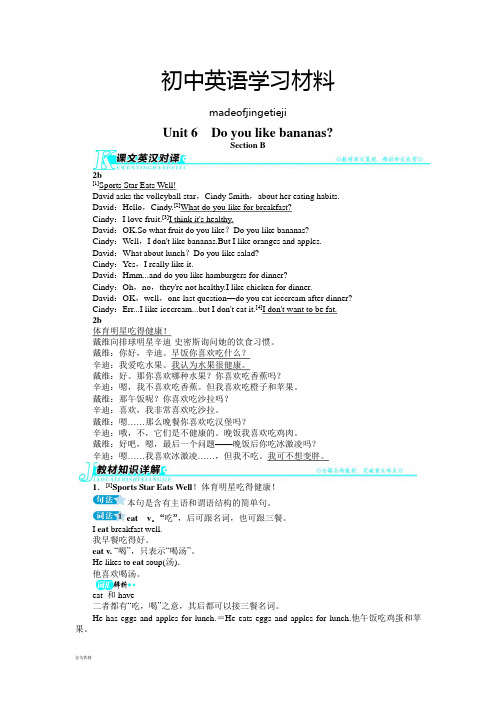
初中英语学习材料madeofjingetiejiUnit 6Do you like bananas?Section B2b[1]Sports Star Eats Well!David asks the volleyball star,Cindy Smith,about her eating habits.David:Hello,Cindy.[2]What do you like for breakfast?Cindy:I love fruit.[3]I think it's healthy.David:OK.So what fruit do you like?Do you like bananas?Cindy:Well,I don't like bananas.But I like oranges and apples.David:What about lunch?Do you like salad?Cindy:Yes,I really like it.David:Hmm...and do you like hamburgers for dinner?Cindy:Oh,no,they're not healthy.I like chicken for dinner.David:OK,well,one last question—do you eat icecream after dinner?Cindy:Err...I like icecream...but I don't eat it.[4]I don't want to be fat.2b体育明星吃得健康!戴维向排球明星辛迪·史密斯询问她的饮食习惯。
戴维:你好,辛迪。
早饭你喜欢吃什么?辛迪:我爱吃水果。
我认为水果很健康。
戴维:好。
那你喜欢哪种水果?你喜欢吃香蕉吗?辛迪:嗯,我不喜欢吃香蕉。
但我喜欢吃橙子和苹果。
【人教版】2020七年级英语上册 Unit 6 Do you like bananas Section B(2a-2c)同步练习
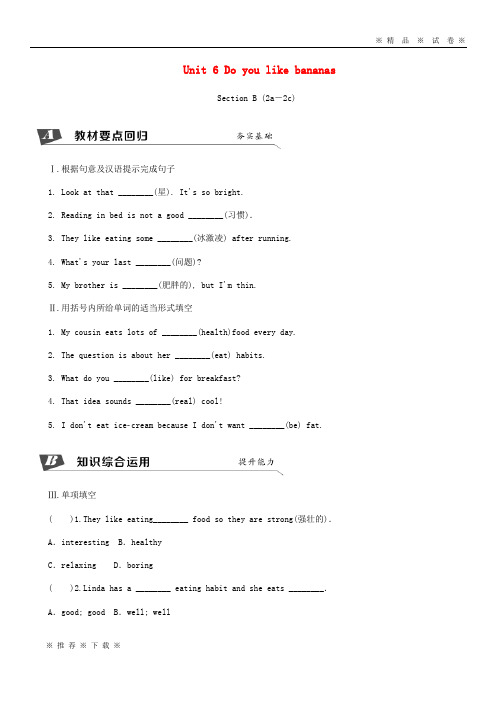
Unit 6 Do you like bananasSection B (2a-2c)Ⅰ.根据句意及汉语提示完成句子1. Look at that ________(星). It's so bright.2. Reading in bed is not a good ________(习惯).3. They like eating some ________(冰激凌) after running.4. What's your last ________(问题)?5. My brother is ________(肥胖的), but I'm thin.Ⅱ.用括号内所给单词的适当形式填空1. My cousin eats lots of ________(health)food every day.2. The question is about her ________(eat) habits.3. What do you ________(like) for breakfast?4. That idea sounds ________(real) cool!5. I don't eat icecream because I don't want ________(be) fat.Ⅲ.单项填空( )1.They like eating________ food so they are strong(强壮的).A.interesting B.healthyC.relaxing D.boring( )2.Linda has a ________ eating habit and she eats ________.A.good; good B.well; wellC.well; good D.good; well( )3.I eat________ egg and________ fruit for breakfast.A.a; a B.an; anC.an; some D.some; some( )4.Does she have a good ________ habit?A.eating B.eatsC.to eat D.eat( )5.Bananas, apples, pears and strawberries are ________.A.salad B.fruitC.vegetables D.drinks( )6.I like apples, ________ I will buy some.A.so B.butC.or D.to( )7.Let's ________ to school, OK?A.run B.runsC.running D.to run( )8.Ann eats two________ and drinks some ________ for breakfast. A.hamburgers; orangesB.hamburger; orangeC.hamburger; orangesD.hamburgers; orange( )9.People have ________ in the middle(中间) of the day. A.breakfast B.lunchC.supper D.a dinner( )10.—I like hamburgers for breakfast. ________ you?—I like rice and vegetables for it.A. What doB. Do you likeC. What aboutD. DoesⅣ.按要求完成下列各题,每空一词1.He likes salad very much.(改为否定句)He ________ ________ salad at all.2.She likes chicken__and__rice.(对画线部分提问)________ ________ she ________?3.They eat eggs,__bananas__and__apples for breakfast.(对画线部分提问) ________ ________ they ________ for breakfast?4.My parents like vegetables.(改为一般疑问句,并作肯定回答)—________ ________ parents like vegetables?—Yes, ________ ________.5.My sister really likes icec ream.(对画线部分提问)________ ________ your sister really ________?Ⅴ.根据汉语意思完成句子,每空一词1.她每天都吃健康食品。
- 1、下载文档前请自行甄别文档内容的完整性,平台不提供额外的编辑、内容补充、找答案等附加服务。
- 2、"仅部分预览"的文档,不可在线预览部分如存在完整性等问题,可反馈申请退款(可完整预览的文档不适用该条件!)。
- 3、如文档侵犯您的权益,请联系客服反馈,我们会尽快为您处理(人工客服工作时间:9:00-18:30)。
Starter Unit 1
1
2
3
4
1.Good morning, Helen!(教材PS1)早上好,海伦! [解读] good morning意为:“早上好,上午好”,常用于早晨或上午 (中午12点之前)向其他人问候,用于较正式的场合;在非正式场合中, 如果对方是熟悉的人,还可以说:morning。 注意回答这些问候语时,都可以重复对方的话,也可以向其进行 问候。 —Good morning,Miss Wang. 早上好,王小姐。 —Morning.早上好。
1
2
3
4
归纳英语中,不同时间段的常见的问候语有:
1
2
3
4
注意Good night!并不是问候语,而是晚上分别时或就寝前的道别 用语,意为“晚安!”“再见”。 口诀助记见面歌 日常用语很重要,见面招呼少不了。 good morning道声“早”,good afternoon“下午好”。 熟人之间用“Hello!”晚上寒暄说什么? good evening最适宜,good night道晚安。
1
2
3
4
1
2
3
4
2.Hi,Bob!(教材PS1)你好,鲍勃! Hello,Frank!你好,弗兰克! [解读1] hi用于熟悉的人之间的问候,常用于非正式的场合,有时 也用于引起别人的注意。 —Hi,Bill!——你好,比尔! —Hi,Cindy!——你好,辛迪! [解读2] hello是较随便的、不分场合的一种问候语,回答也用 hello。 hello的用法如下: ①打招呼:Hello,Andy!嗨,安迪! ②打电话:Hello,this is Tom.喂,我是汤姆。 ③问候:Hello,Lucy!你好,露西!
Section B & Self Check
1
2
3
4
5
1.Sports Star Eats Well!(教材P35)体育明星吃得很好! [解读1] eat 是动词,意为“吃”。 She eats some fruit for dinner. 她晚饭吃些水果。
1
2
3
4
5
1
2
3
4
5
[解读2] 句中的well是副词,意为“好”,用来修饰动词eat,意为 “吃得好”。 Peter eats very well at school. 彼得在学校里吃得很好。 Tom likes basketball.He plays it very well. 汤姆喜欢篮球。他打得很好。
1
2
3
4
5
[解读2] breakfast前面不加定冠词,当前面有形容词修饰时,通常 加不定冠词。 After a nice breakfast,he goes to school. 吃了可口的早饭后,他上学去了。 注意“三餐”lunch,dinner,supper/dinner都遵循同样的用法。
1
1
2
3
4
5
1
2
3
4
5
1
2
3
4
5
3.What do you like for breakfast?(教材P35)你早餐喜欢吃什么? [解读1] 该句还可以改为:“What do you have for breakfast?”询问 某人某餐吃什么可以说“What do/does+sb.+have/like+for+某 餐?”for是介词,表示用途、对象、目的等。 —What do you have/like for lunch? 午餐你吃什么? —I have/like hamburgers and fruit. 我午餐吃汉堡和水果。 拓展sb.have/like...for+某餐,意为“某人某餐吃……”。 I have/like rice and vegetables for lunch. 午餐我吃米饭和蔬菜。
I want a new bike. 我想要一辆新自行车。 She wants to open the window. 她想把窗户打开。 My mother wants me to go to college. 我妈妈想让我上大学。1234 Nhomakorabea5
[解读2] 句中的be表示状态,意为“变成;成为”,相当于动词 become。 I want to be a teacher. 我想成为一名老师。
Starter
知识点 1.见面问好 Starter Unit 1 2.打招呼 3.问健康 4.致谢 1.问某东西 Starter Unit 2 2.不定冠词 a 和 an 3.询问拼写句式 1.表达和询问颜色 Starter Unit 3 2.定冠词 the 3.情态动词 can
考查星级 ★ ★★ ★★ ★★ ★★ ★★★ ★★★ ★★ ★★★ ★★★
2
3
4
5
1
2
3
4
5
1
2
3
4
5
4.I think it’s healthy.(教材P35)我认为它是健康的。 [解读] healthy是形容词“健康的”,其反义词是unhealthy“不健 康的”。其名词形式是health“健康”;其副词形式是healthily“健康 地”。 Tom eats lots of healthy food. 汤姆吃许多健康的食品。 It’s good for your health. 这对你的健康有好处。 拓展表达“健康”的常用短语
1
2
3
4
5
5.I don’t want to be fat.(教材P35)我不想长胖。 [解读1] want意为“想;想要”,相当于would like,但would like的 语气更委婉。其常见用法如下: want sth.想要某物
want to do sth .想要做某事 want sb.to do sth .想要某人做某事
1
2
3
4
5
1
2
3
4
5
2.David asks the volleyball star,Cindy Smith,about her eating habits.(教材P35)大卫询问排球明星辛迪· 史密斯的饮食习惯。 [解读1] ask...about...意为“询问……有关……”,常用短语ask sb.about sth.意为“向某人询问某事”。about表示“关于”,是介 词,用来解释说明(问的)是哪方面的问题。 My father asks me about my study. 我爸爸向我询问我的学习情况。 [解读2] eating habits意为“饮食习惯”,其中eating是动词-ing形 式作定语,修饰habits。类似短语还有:swimming pool 游泳 池;reading room 阅览室 拓展habit常构成短语have a habit of...,意为“有一个……的习 惯”。 He doesn’t have a good habit of learning English. 他没有学习英语的好习惯。
